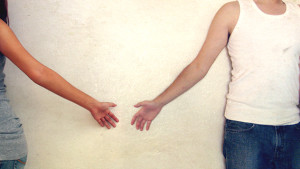My dad was so poor as a child that dinners during the Depression era consisted of white bread soaked with milk and sprinkled with sugar. Fortunately, Dad entered young adulthood when corporate America was feeling its post-World War II growth surge.
He joined the ranks of suited young executives and made a life for himself, ever after that time shunning meatless dinners as a relic of his poverty-stricken past. Every night our table featured a good, all-American meal built around a piece of chicken, steak or pork wallowing in its own fat-rich juices.
Imagine Dad's consternation when I became a vegetarian at age 15, refusing the meat that he would have gladly traded his bowl of white bread mush for. Several other slaps-in-the-face followed—a pot-smoking boyfriend, a party life, an interest in weird religions and a general nonconformist attitude.
I pulled the trump card when I dropped out of college and moved to a Christian commune at 19.
Christianity had unexpectedly come into my life during my first year of college. The exhilarating freedom of the first year away from home had given way to a state of loneliness and questioning, into which God stepped. Once I surrendered to His reality, He was everywhere, speaking through nature, through life experiences, through the Bible.
I was supercharged with a mission to tell my friends—many of whom dabbled in the occult, in alternative sexualities, and in New Age religions.
A friend named Al summed up their reactions when he said,
“This is just another one of your trips, Jennifer.
It will pass and you will go on to something else.”
I wish I knew where Al was; I'd tell him I'm still a Christian more than 25 years later.
The constant barrage of insults from unbelieving friends urged me toward finding a Christian community. Then I met a group of Seventh-day Adventists— who not only believed in Jesus, but practised a healthy, compassionate and vegetarian lifestyle! Instantly I knew this was the religion for me.
When they invited me live with them in the country, I knew the next phase of my life had arrived. But my stint with these new friends proved that we often carry our old baggage into our religious experience. Never was there a more dedicated Christian than myself, but my dedication didn't provide a short cut to holiness.
I have to be careful how I present this thought, for I don't want to make God look inadequate to heal any part of us, be it physical, mental or emotional.
Let me say it this way: While instant healing is at the tip of His sovereign fingers, it doesn't always translate into the human realm. Sometimes it is our own perverse will that keeps us from wholeness. He may tap us on the shoulder, trying to point out certain wrong patterns in our thinking and behaviour, and we can completely tune Him out.
My spiritual deafness involved food.
The Adventists I was with embraced a plant-based, simple approach to eating, which was good, but I reasoned that if simplicity was good, then stringency was better. My food choices dwindled as I decided one food after another was too rich, too complicated or just too suspiciously tasty. I was left with a diet of raw vegetables and fruits and occasional handfuls of cooked grains.
One person after another came to me, pleading—“ Don't be afraid to eat, Jennifer.” “You'd look better with a little more weight.” “It's possible to be too strict with food, you know.” They didn't realise how pleasurable self-starvation can feel. For ages, piety seekers have attempted to feed the spirit by depriving the body. It doesn't really work, but it feels like it does.
Fasting brings a sense of serenity, which is at least partly attributable to lack of blood sugar in the brain. For some, that sense of detachment can become quite addictive. There is also a sense of superiority that comes—a smug belief that you are much more “spiritual” than others. These things make religiously influenced anorexia a highly addictive escape from reality, and one that masquerades as passionate faith.
The development of anorexia was me shifting baggage from one psychological hand to the other. As a teen, peer pressure sent me into a litany of risky behaviours. As a Christian, the pressure was from my own warped idea of what God required of me. So I went from pagan dissipation to religious fanaticism, which are both ways of avoiding God.
The first to come unglued over my condition was my mother. I was careless enough to change my clothes in front of her one day, prompting her to squeal my name in shock.
“Jennifer!” “What, Mum?” I whirled around and looked at her terrified face.
“You're so thin! What happened to you? You used to be a robust, healthy young lady, and now you're—you're skin and bones!” All such reactions, many of which followed, pulled me in two directions; one was sorrow that these worried ones were hurting over me; two was pride that my “accomplishment” was noticed. The second reaction won out for three years.
Then there was Michael. Michael looked after the large organic garden in our community. Every morning I leaned out my window to hear his soaring tenor voice as he went about his work. A secret crush made goose bumps appear on my skin whenever he spoke to me.
Michael moved away to the West, but he didn't forget me. Having experienced his own religiously induced bout of self-starvation, he felt he could save me out of mine. His story was quite dramatic; before becoming a Christian he had lived in a Zen Buddhist ashram, where strict dietary regulations shrunk him down to a sliver of a man. One day he watched the leader of the ashram levitate off the floor and decided the place was too spooky for him. Back in the world, his health was so frail he couldn't function, and he collapsed on the floor of his apartment. Fortunately, a young lady found him there and revived him with chicken broth. After later becoming a Christian, he understood the danger of food fanaticism and decided to wage his own small war against it, starting with me. But he had to marry me first.
Most of our courtship took place in New York State. Michael worked as the local handyman, and I worked in a small vegetarian restaurant. The anorexia continued, and Michael gently expressed concern: “You might think about eating a little more, Jen. I used to starve myself too, but I decided it didn't make me more holy. If you gained a little more weight, you'd feel better.” When a black sore appeared on my leg, Michael acted as if he expected it.
“It's because you're immune system is weak and you can't fight infection,” he said. Gentleness succeeded where sharp criticism had failed, and I found myself listening to him.
Then I contracted a flu that rendered me unable to eat for an entire week, and quickly evaporated down to 34 kilograms.
Michael helped me to the doctor, where I was prescribed a very simple remedy: eat. The problem was that my stomach was shrunken to a fraction of its proper size, and the addictive cycle of self-starvation had entrenched itself and would require a change in my thinking and my entrenched behavioural patterns.
Rather than waiting for me to change, Michael banked on it and married me when I was still too thin. We have pictures of us together; Michael in a jean shirt, broad-shouldered and strong with a muscled arm around me—a withered waif. His faith in me paid big dividends— only weeks into our marriage I started eating normally. Photos from the next era feature Michael with a rounded, rosy-cheeked version of me. The pictures testify to the ultimate effect of unconditional love.
The knowledge that one is loved acts like a balm upon the deepest recesses of the heart. It soothes and comforts away the loneliness that dogs our steps.
But love is also what C S Lewis terms a “lord of terrible aspect,” because as it draws the soul into intimacy, it requires the highest price—the giving up of selfcentred isolation with its many twisted indulgences.
Because of the love of the man who is now my husband of 27 years, I found healing from anorexia—a disorder that has the highest rate of fatality of any psychological disease.
I owe Michael my life. In truth, I owe my life to God, who loved me through Michael and continues to love me in spite of my failings.




